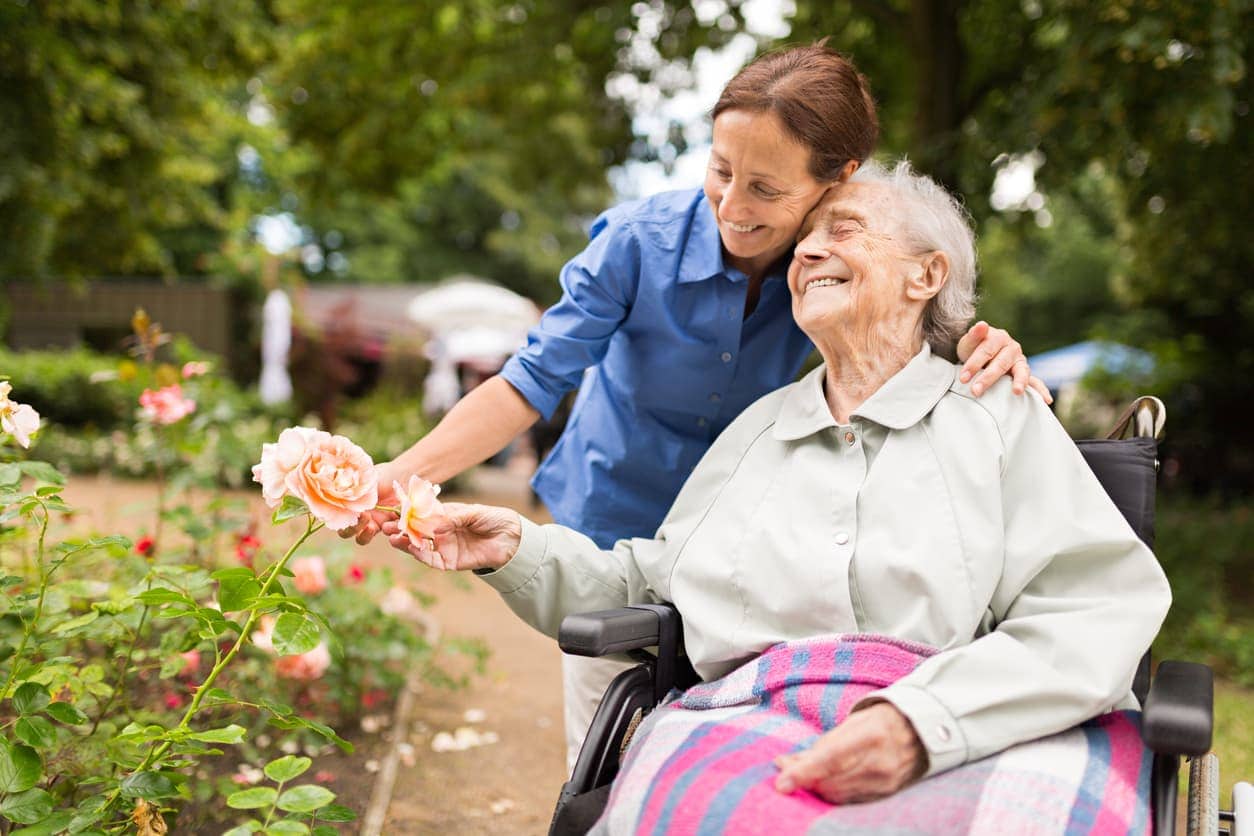
How to Know When It’s Time for Memory Care
If your loved one lives with Alzheimer’s disease or dementia, you know that their symptoms progress over a long time, making it hard to know what kind of care they need. At first, you may think, “I should be able to handle this.” But as cognitive function significantly declines, you may find yourself considering memory care for your senior.
It’s normal for family members to feel guilt and grief when they realize they can’t manage the increasing care needs of loved ones with dementia. It’s a decision no person wants to make but can quickly become the new reality. As much as it hurts to consider moving a loved one from the familiarity of their home, handling all of the caregiving yourself takes a toll on your own physical and mental health, plus it’s not always the best choice for your loved one.
Typically, memory care is an option for people suffering from mid to late-stage Alzheimer’s disease or dementia when the condition creates more significant changes and challenges in a person’s life. The disease will eventually progress, and at some point, your loved one will need 24-hour supervision. To know where you are on this journey, working closely with your loved one’s medical team will help you determine when the time is right.
If your senior lives alone, it can be harder to see the changes. You may visit and discover that their appearance, cleaning regimen, and social schedule have changed dramatically. Sometimes, you’ll find out things are worse than you imagined if your loved one has a medical emergency or a life-threatening accident.
If you’re worried about your senior’s safety or the safety of others, it could be time to get the family together to weigh options. Many seniors desire to live at home for as long as possible, but it’s wise to have a plan in place before a move is necessary. Discussing possible changes while your loved one can still better comprehend allows your senior to participate in the decision and feel more at ease about the future. It’s not always the case, but your mom or dad may resist and refuse to move from the house they love—and that’s completely understandable. You can expect a conversation that might be difficult, so prepare in advance.
Here are some ways to word the conversation:
- Mom, I’m concerned for you living alone. I know keeping up with the house is getting more difficult and I want you to feel less stressed. I also want you to be safe. I have some ideas on what to do. Is this a good time to talk?
- Dad, it’s not your fault, but I’m worried that you might have an accident and hurt yourself. Can we talk about other options for you for the future?
- I’m so sorry you’re having a hard time on your own. Would you mind sitting down with me and the family to see how we can help?
- Mom, I’m trying my best, but I don’t feel like I’ll be able to keep up with everything that needs to be done around the house, including all the errands and appointments. I think it’s time to discuss ways that others can help us out.
- I want the best for you, Dad, and even with me doing my best, I’m unable to give you the care I think you need. There are places and caregivers that specialize in your particular health conditions. Will you talk with me about it and help us all make the right decision?
- We know the house is very sentimental to you and that you want to live here for the rest of your life. We want that for you, too, but with the way the dementia is starting to progress, we fear for your safety and wellbeing. If we could be here 24/7, we would, but with jobs and family responsibilities, it’s nearly impossible. Mom, will you at least let us share with you what we found out about some local places that specialize in memory care?
If your loved one already lives in a retirement community, professionals who see them frequently can make a note of changes and let you know about signs that your loved one’s memory loss is progressing. Many times, we listen to someone from the outer circle over those closest to us, so it’s not a bad idea for your senior’s physician to join in on the conversation with the family.
More signs that it’s time to consider memory care include:
- Difficulty managing medications
- Behavioral changes like aggression, agitation, high anxiety, and paranoia
- Wandering or becoming lost while navigating a familiar area
- Forgetting to eat or eating questionable items, like spoiled or rotten foods
- A home environment that’s increasingly unhealthy: hoarding items, trash piling up, unpaid bills
- Consistently forgetting appointments and activities
- A decline in health or an increase in falls
- Accidents that endanger their lives and the lives of others: forgetting to turn off the faucet or stove, starting a microwave fire, leaving the home unlocked, letting the dog run away, opening the door to strangers
- Mobility problems, vision problems, unhealthy weight loss
- Hallucinations
- Getting little sleep or sleeping all day
- Incontinence
- A decline in the health and abilities of the caregiver
Living at home is the goal for many people with dementia, but it may not be the healthiest or safest environment. There are advantages to living in a memory care community designed to keep residents healthy and engaged. Regular meals, customized care plans, activities, and a calming environment can help slow the progression of the disease. Residents have more freedom to explore indoor and outdoor spaces safely and securely. If your family can’t provide these things at home, a memory care community may be the answer.
If you’re wondering if memory care is the right option for your senior, here are some questions that can guide decision making:
- Can I provide supervision for my loved one now and in the future, knowing that they will eventually need round-the-clock care?
- Is my senior safe at home? Do I worry about them constantly?
- Is my senior’s health at risk? As a caregiver, is my health at risk?
- Could my senior’s behavior harm anyone else?
- What do other family members suggest? What do medical professionals suggest?
- How would my senior feel about a move?
- What are my loved one’s must-haves in a memory care community? (Examples: flexible visitation policy; soft-spoken caregivers; private room; outdoor spaces; pet therapy)
- Am I balancing my other responsibilities (work, family, myself) with my role as a caregiver?
- Is my senior too isolated? Would the interaction and activities at a memory care center benefit them?
- Do I have the emotional resources to care for them as their needs increase?
- Do I have additional outside support as well?
- Can the family agree on a safe and comfortable place for our loved one?
- What is our budget and can we get outside financial assistance?
- What is the physical and emotional cost of not getting this type of specialized care for my loved one?
If memory care is an option for your senior, professionals advise having these conversations before the more dangerous symptoms of Alzheimer’s disease or dementia begin. Getting settled at a memory care residence before the later stages of the condition allows your senior to meet new friends and enjoy the enriching activities and outings that a memory care community offers. Especially with a senior who’s extra nervous and upset about a move, a compassionate memory care community can set up many of your loved one’s creature comforts before they arrive, so that it’ll feel more like home.
Taking good care of a loved one sometimes means putting their care in the hands of trained specialists like those at Avalon. A daily routine, structure, and stimulation from other residents and staff will only help them, which may help you. A good memory care community will enable you to be part of your loved one’s daily life and participate in their care as needed. And you’ll have a calmer, more contented relationship with your senior and return to enjoying each other’s company.
See More Articles
-
Visiting Your Aging Parent With Memory Loss at Avalon Memory Care
As a loving son or daughter, you naturally want the best of care for your senior parent. The compassionate assisted living caregivers at Avalon Memory Care want you to know that while your parent is living with us, he or she will receive nothing less than respectful, loving care within our comfortable, safe, and fully-staffed
-
Celebrating New Year’s Day in Memory Care
Families often find that celebrations with their loved ones in memory care are easier when they embrace new traditions. For instance, it may not be practical to expect your loved one to stay up until midnight on New Year’s Eve. Instead, consider throwing a New Year’s Day celebration, complete with a countdown to the first
-
Understanding Parkinson’s Disease and Dementia
Parkinson’s disease is an incurable neurological disorder, with progressively worsening complications. Perhaps the most well-known symptom of Parkinson’s is a hand tremor, but it can also cause speech changes, muscle rigidity, and impaired posture. Eventually, as the disease progresses, more than half of all individuals with Parkinson’s will require dementia care. This particular type of
Testimonials
Downloadable Resources
We Are Avalon
Discover the heart of our community; download ‘We Are Avalon’ to get to know our dedicated team and our commitment to providing a warm, family-like environment.
Transitional Care Guide
If you’re considering a transition, we’re here to help; download our Transitional Care Guide for compassionate guidance through each step of the process.
Schedule a Tour
Visit one of our 30+ campuses and experience our unique approach to memory care.












